Mixpanel revolutionized product analytics by making it easy to track user behavior beyond simple pageviews. But as powerful as it is, many teams are searching for Mixpanel alternatives and competitors that better fit their needs, budget, or privacy requirements. Whether you need a free open source option you can self-host or an affordable cloud tool, there are strong alternatives worth considering in 2026.
The surge in demand for Mixpanel alternatives stems from several pain points that teams frequently encounter:
Pricing Shock: Mixpanel's pricing can escalate quickly as your user base grows. What starts as a manageable $28/month can balloon to thousands of dollars once you exceed the free tier limits. For startups and growing companies, this unpredictable cost structure makes budgeting difficult.
Data Privacy Concerns: With increasing privacy regulations like GDPR and CCPA, many companies need analytics tools that prioritize user privacy. Mixpanel's cloud-based model means your user data lives on their servers, which can be a compliance headache for privacy-conscious organizations.
Vendor Lock-in: Once you've invested heavily in Mixpanel's ecosystem, migrating away becomes challenging. Your data, dashboards, and integrations create dependencies that make switching costly and time-consuming.
Feature Overload: While Mixpanel offers powerful features, many teams find themselves paying for complexity they don't need. Sometimes a simpler solution that focuses on core analytics is more valuable than an all-encompassing platform.
Self-hosting Requirements: Some organizations, particularly in regulated industries, need to keep analytics data within their own infrastructure. Mixpanel's cloud-only approach doesn't accommodate these security and compliance requirements.
In this guide, we'll explore 13 Mixpanel alternatives — 7 in-depth reviews of the strongest competitors plus 6 honorable mentions worth knowing about. Whether you're looking to reduce costs, improve privacy, or gain more flexibility, there's an alternative that fits your needs. If you're also interested in web analytics tools, check out our guide to open-source web analytics.
Here's a quick comparison of all 7 top alternatives:
| Tool | Type | Open Source | Self-Host | Free Tier | Paid From | Best For |
|---|---|---|---|---|---|---|
| OpenPanel | Web + Product | Yes (AGPL-3.0) | Free | 30-day trial | $2.50/mo | Affordable, privacy-first product analytics |
| PostHog | Product + More | Yes (MIT) | Free | 1M events/mo | Usage-based | All-in-one: analytics + replay + flags |
| Heap | Product | No | No | 10K sessions/mo | ~$3,600/yr | Autocapture and retroactive analysis |
| Amplitude | Product | No | No | 10M events/mo | Contact sales | Enterprise ML-powered analytics |
| Pendo | Product + UX | No | No | 500 users | Contact sales | Analytics + in-app guides + feedback |
| Matomo | Web + Product | Yes (GPL-3.0) | Free | Self-hosted free | €23/mo (cloud) | Privacy-first, GDPR-compliant analytics |
| GA4 | Web + Product | No | No | 25M events/mo | ~$50K/yr (360) | Free analytics at scale, Google ecosystem |
Now let's look at what matters when choosing a Mixpanel alternative, then dive deep into each tool.
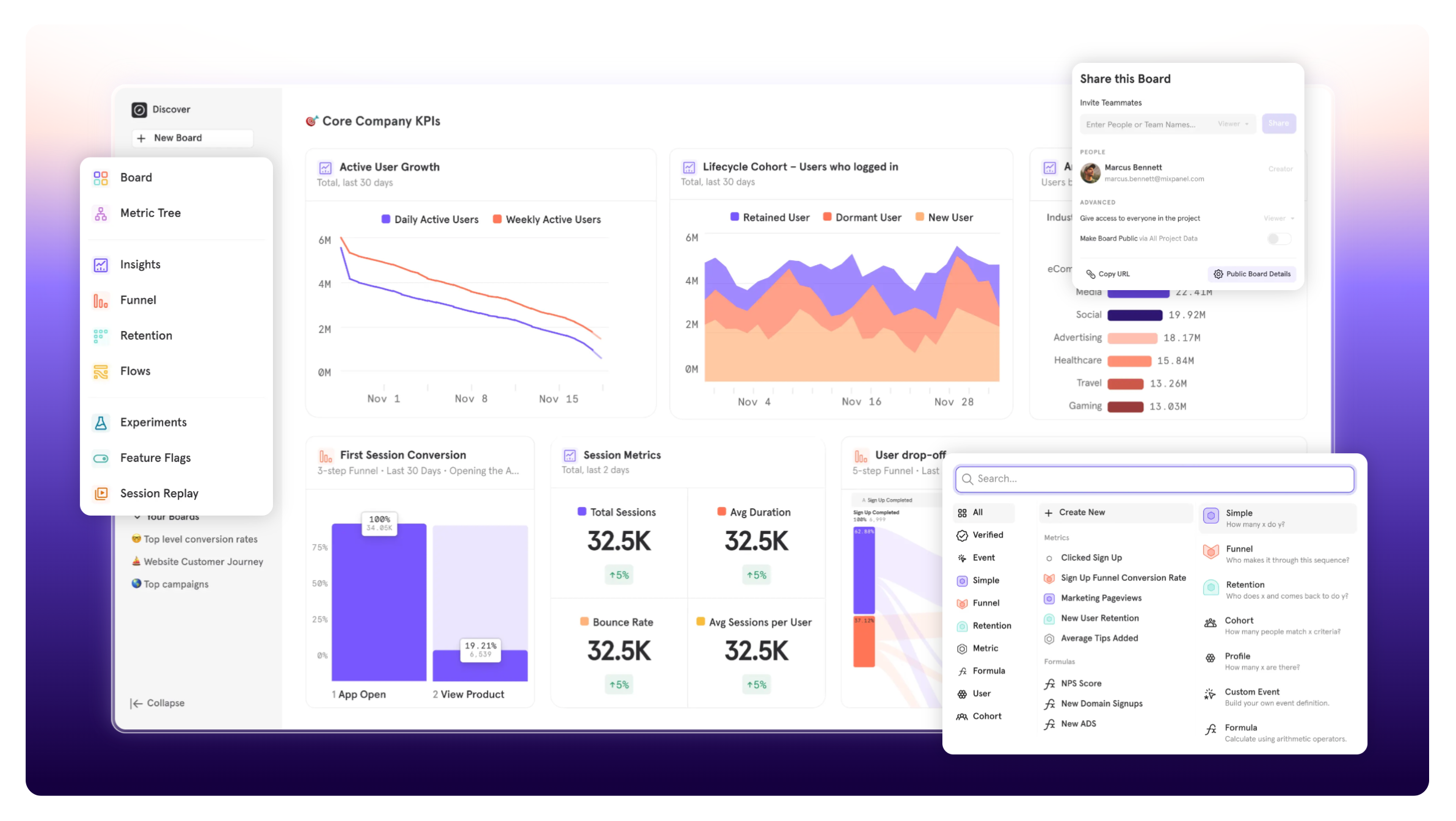
What Makes a Good Mixpanel Alternative?
Before diving into specific tools, let's establish what features are essential for any Mixpanel alternative:
Core Product Analytics Features
Event Tracking: The foundation of product analytics. You need to track custom events like signups, purchases, feature usage, and any user action that matters to your business. The tool should support event properties and user properties for rich data collection.
Funnel Analysis: Understanding conversion rates through multi-step processes is crucial. Whether it's onboarding, checkout, or feature adoption, you need to visualize where users drop off and optimize accordingly.
Retention Analytics: Track how often users return and engage with your product over time. Look for cohort analysis, retention curves, and the ability to segment users by behavior patterns.
User Profiles: Individual user timelines help debug issues, understand power users, and provide better customer support. You should be able to see a complete history of each user's actions.
Flexible Dashboards: Pre-built reports are helpful, but you need the ability to create custom visualizations that answer your specific business questions.
Additional Considerations
When evaluating Mixpanel alternatives, also consider:
- Privacy Compliance: Does it offer cookieless tracking? Is it GDPR/CCPA compliant by design?
- Pricing Model: Is it usage-based, seat-based, or flat-rate? Can you predict costs as you scale?
- Self-hosting Options: Can you run it on your own infrastructure for complete data control?
- SDK Coverage: Does it support your tech stack (web, mobile, server-side)?
- Data Export: Can you easily extract your data if you need to migrate later?
- Community Support: Is there active development and a helpful user community?
1. OpenPanel - The Privacy-First Alternative
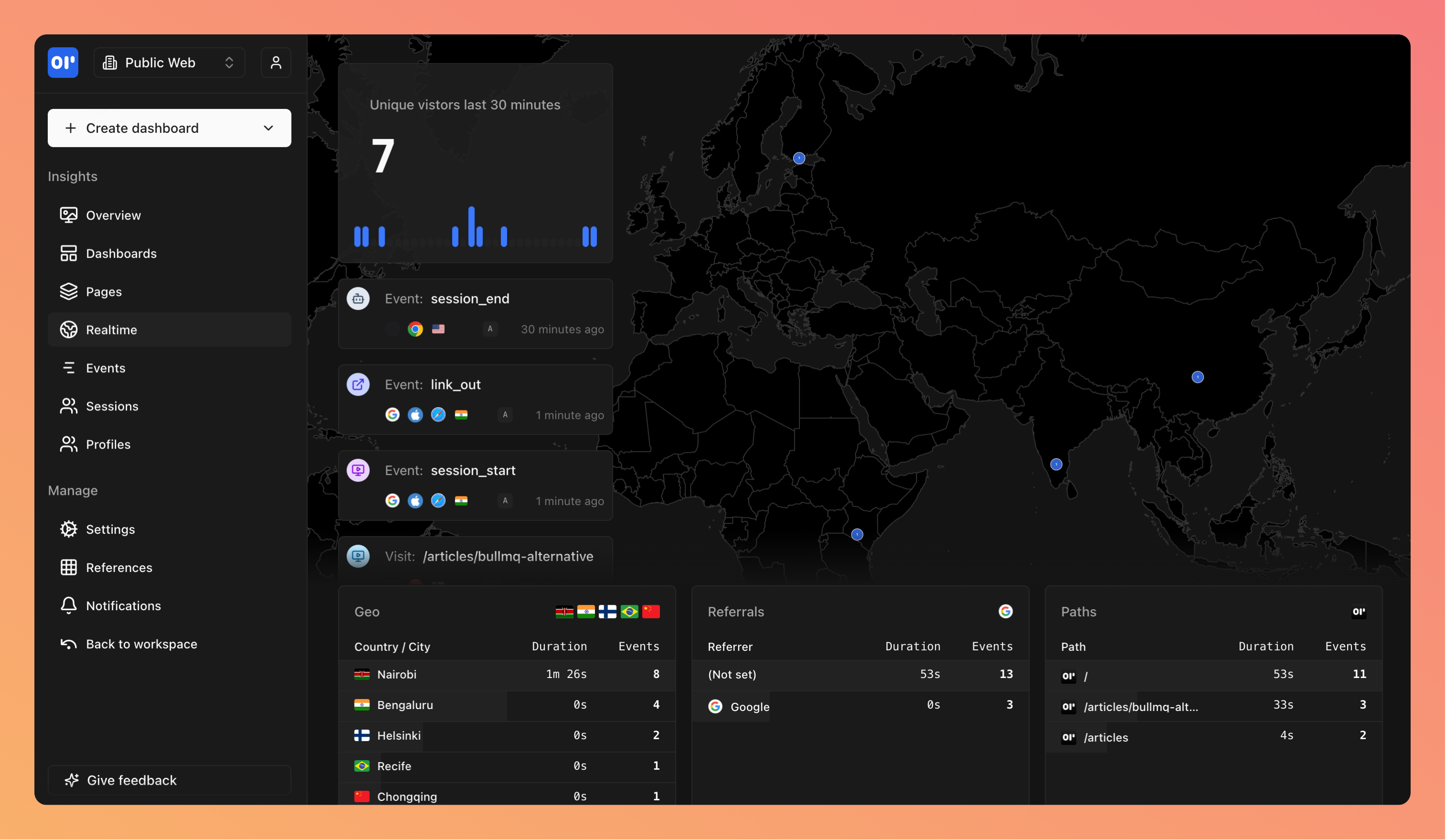
Overview
OpenPanel was built specifically as a Mixpanel alternative for teams that want powerful product analytics without the hefty price tag or privacy concerns. It combines the event tracking capabilities of Mixpanel with the simplicity of web analytics tools like Plausible or Umami.
What sets OpenPanel apart is its dual nature: you get both web analytics (pageviews, sessions, referrers) and product analytics (custom events, funnels, retention) in one platform. This unified approach means you don't need separate tools for different types of tracking.
- Homepage: openpanel.dev
- GitHub: github.com/Openpanel-dev/openpanel
- License: AGPL-3.0 (fully open source)
- Free Trial: 30 days, no credit card required
Pricing
OpenPanel offers transparent usage-based pricing that's significantly more affordable than Mixpanel:
| Events per Month | Price (Monthly) | Price (Annual) | Compared to Mixpanel |
|---|---|---|---|
| Up to 5,000 | $2.50 | $25 | Free tier |
| Up to 10,000 | $5 | $50 | ~$28/month |
| Up to 100,000 | $20 | $200 | ~$89/month |
| Up to 500,000 | $50 | $500 | ~$450/month |
| Up to 1,000,000 | $90 | $900 | ~$779/month |
All plans include unlimited websites, team members, and 5 years of data retention. Self-hosting is completely free with no limitations.
Key Features
Real-time Analytics: See events as they happen with no processing delays. Perfect for monitoring launches or debugging issues.
Custom Event Tracking: Track any user action with properties and metadata. Full support for event-based analytics with automatic event detection.
Funnel Builder: Create multi-step funnels to analyze conversion rates. Visualize drop-off points and optimize user flows.
Retention Analysis: Understand user stickiness with cohort retention charts. Track daily, weekly, or monthly retention patterns.
Individual User Profiles: Drill down into specific user journeys. See complete event timelines for debugging or customer support.
Privacy by Design: Cookieless tracking, no personal data collection, GDPR/CCPA compliant out of the box.
Pros
- Most affordable Mixpanel alternative once you scale beyond free tiers
- Combines web and product analytics, replacing multiple tools
- True open source - self-host with no feature restrictions
- Simple, intuitive interface that's easy for non-technical users
- Real-time data with no processing delays
Cons
- Newer platform with a smaller community compared to established tools
- Fewer integrations than Mixpanel (though SDK coverage is comprehensive)
- No advanced features like predictive analytics or machine learning
- Self-hosting requires technical expertise and infrastructure management
Best For
- Startups looking for affordable product analytics
- Privacy-conscious companies needing GDPR compliance
- Teams wanting both web and product analytics in one tool
- Organizations requiring self-hosted analytics solutions
2. PostHog - The All-in-One Platform
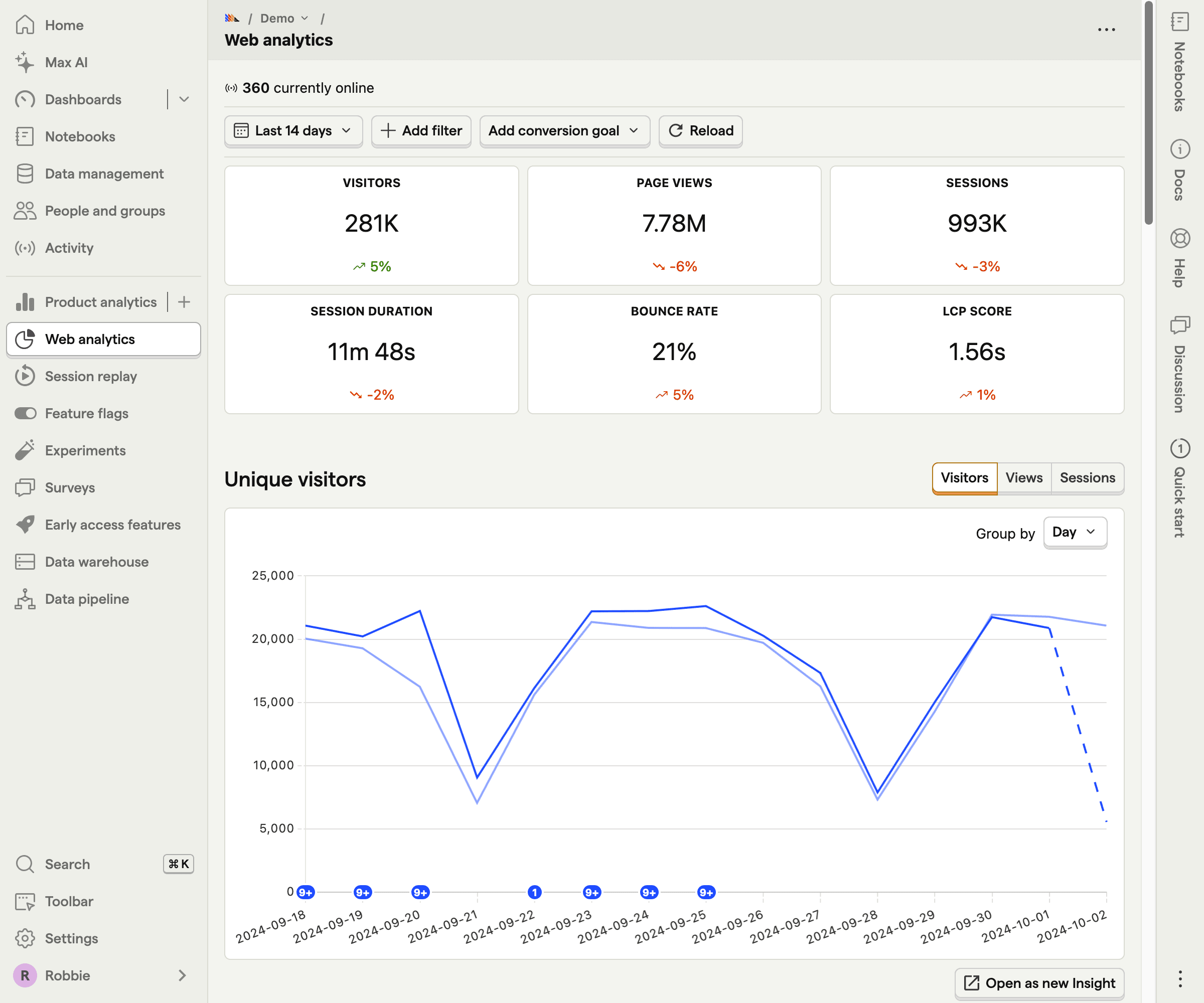
Overview
PostHog positions itself as the all-in-one platform for product development, going beyond analytics to include session replay, feature flags, A/B testing, and surveys. It's a comprehensive Mixpanel alternative that can replace multiple tools in your stack.
Originally built at Y Combinator, PostHog has grown into one of the most popular open-source analytics platforms. While it offers more features than Mixpanel, this comes with added complexity and resource requirements.
- Homepage: posthog.com
- GitHub: github.com/PostHog/posthog
- License: MIT (with some enterprise features requiring a license)
- Free Tier: 1 million events per month
Pricing
PostHog uses a complex usage-based pricing model across different products:
| Product | Free Tier (Monthly) | Price Beyond Free Tier |
|---|---|---|
| Product Analytics | 1 million events | $0.00005/event |
| Session Replay | 5,000 recordings | $0.005/recording |
| Feature Flags | 1 million requests | $0.0001/request |
| A/B Testing | Included with flags | Same as flags |
| Surveys | 250 responses | $0.20/response |
Key Features
Product Analytics: Full event tracking, funnels, paths, retention, and stickiness analysis. Similar to Mixpanel's core offering.
Session Replay: Watch real user sessions to understand behavior and debug issues. Includes console logs and network activity.
Feature Flags: Roll out features gradually with targeting rules. Includes A/B testing capabilities for experimentation.
Heatmaps: Visualize where users click and scroll on your pages (beta feature).
SQL Access: Query your data directly with SQL for advanced analysis.
Pros
- Most comprehensive feature set among Mixpanel alternatives
- Generous free tier (1 million events vs Mixpanel's 100k)
- Strong community and regular updates
- Can replace multiple tools (analytics + replay + flags + surveys)
- Open source with self-hosting option
Cons
- Complex pricing that's hard to predict across multiple products
- Self-hosting requires significant resources (16GB RAM minimum)
- Feature overload can overwhelm smaller teams
- Some features only available in paid cloud version
- Higher learning curve than simpler alternatives
Best For
- Teams wanting to consolidate multiple tools
- Companies needing session replay alongside analytics
- Organizations already using feature flags
- Developers who prefer SQL access to data
3. Heap - The Autocapture Alternative
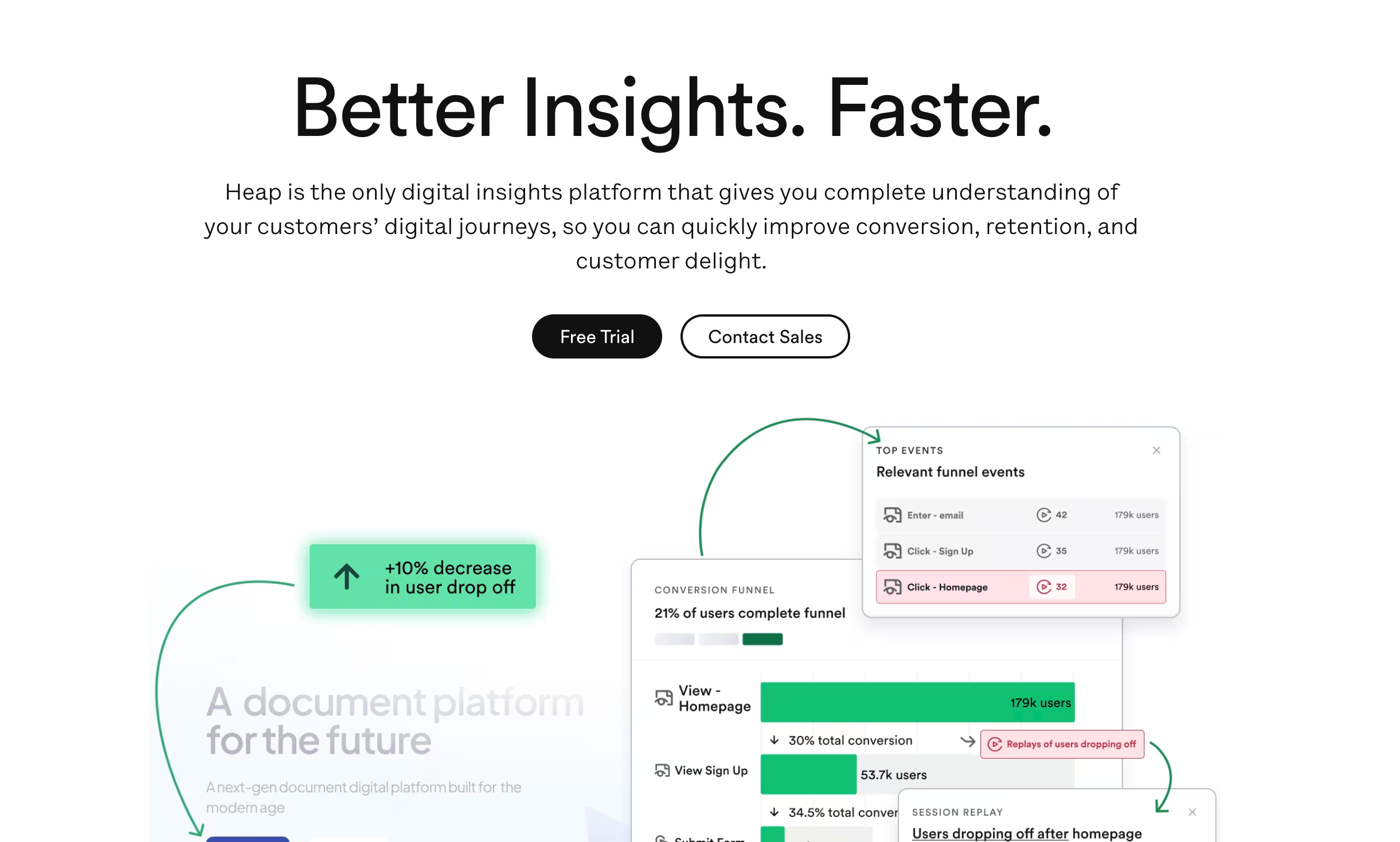
Overview
Heap takes a fundamentally different approach to product analytics: instead of manually tracking specific events, it automatically captures every user interaction. This "autocapture" approach means you can analyze user behavior retroactively without having to instrument events beforehand.
This is particularly valuable when you realize you should have been tracking something weeks ago. With traditional analytics, you're out of luck. With Heap, the data is already there waiting to be analyzed. The visual labeling system lets non-technical team members define events by clicking on elements in your product.
- Homepage: heap.io
- Trial: Free plan available
- License: Proprietary
Pricing
Heap offers a free tier and custom enterprise pricing:
| Plan | Sessions/Month | Price | Features |
|---|---|---|---|
| Free | Up to 10,000 | $0 | Core analytics, 1 year retention |
| Growth | Custom | Starting ~$3,600/year | Advanced features, longer retention |
| Pro | Custom | Contact sales | Full platform, premium support |
| Premier | Custom | Contact sales | Enterprise features, SLAs |
Note: Heap's paid pricing starts high and requires annual contracts. The free tier is generous but limited.
Key Features
Autocapture: Automatically tracks all clicks, form submissions, page views, and interactions without manual instrumentation.
Visual Labeling: Define events by clicking on elements in your product interface - no code required.
Retroactive Analysis: Analyze historical data for events you define today, going back to when you first installed Heap.
Session Replay: Watch user sessions to understand behavior and debug issues.
Advanced Funnels: Build conversion funnels with the captured data to identify drop-off points.
Pros
- No need to manually instrument events upfront
- Non-technical users can define events visually
- Retroactive analysis of historical data
- Comprehensive data capture ensures nothing is missed
- Strong session replay capabilities
Cons
- Expensive compared to alternatives (starts around $3,600/year)
- Autocapture generates massive amounts of data
- Can be overwhelming to navigate all the captured events
- Privacy concerns with capturing everything
- Free tier is limited to 10k sessions (not events)
Best For
- Large enterprises with complex analytics needs
- Teams that need retroactive event analysis
- Organizations with non-technical users defining events
- Companies willing to pay premium prices for convenience
4. Amplitude - The Enterprise Alternative
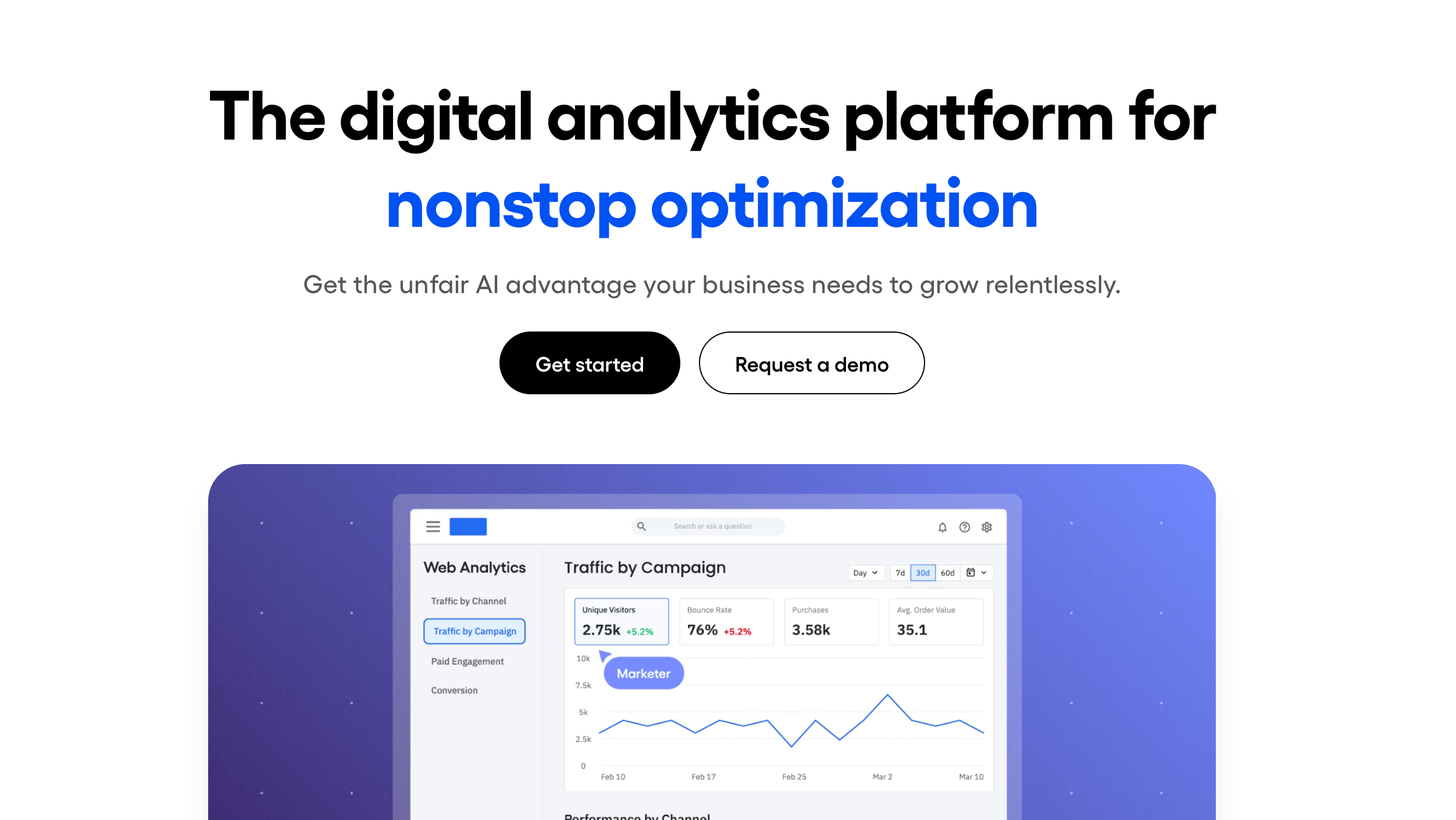
Overview
While not open source, Amplitude is worth mentioning as it's Mixpanel's primary competitor in the enterprise space. It offers similar features with some unique advantages, particularly around data governance and advanced analytics.
Amplitude pioneered the generous free tier model (10 million events/month) and focuses heavily on behavioral analytics. Their platform includes advanced features like predictive analytics and automated insights that go beyond traditional product analytics.
- Homepage: amplitude.com
- Free Tier: 10 million events per month
- License: Proprietary
Pricing
Amplitude's pricing isn't publicly available for paid tiers, but their free tier is notably generous:
| Plan | Events/Month | Price | Features |
|---|---|---|---|
| Starter | 10 million | Free | Core analytics, 2 years retention |
| Growth | Custom | Contact sales | Advanced features, governance |
| Enterprise | Custom | Contact sales | Full platform, SLAs |
Key Features
Behavioral Cohorting: Advanced user segmentation based on actions, not just properties.
Predictive Analytics: ML-powered predictions for conversion and churn.
Data Governance: Better data quality tools and taxonomy management.
Cross-Platform Tracking: Unified analytics across web, mobile, and offline.
Pros
- Most generous free tier (10M events vs Mixpanel's 100k)
- Advanced ML-powered insights
- Better data governance tools
- Strong mobile analytics capabilities
Cons
- Not open source - vendor lock-in concerns
- Opaque pricing for paid tiers
- Steep learning curve
- Overkill for smaller teams
Best For
- Large enterprises with complex analytics needs
- Companies wanting ML-powered insights
- Teams needing advanced data governance
- Organizations with large free tier requirements
5. Pendo - The Product Experience Alternative
Overview
Pendo goes beyond traditional product analytics by combining behavioral tracking with in-app guidance, user feedback, and product planning tools. It's designed for product managers who want to understand how users interact with their product and then act on those insights directly within the application.
Where Mixpanel focuses purely on analytics, Pendo helps you close the loop: analyze behavior, then deploy targeted in-app guides, tooltips, and announcements to improve adoption and onboarding without writing code.
- Homepage: pendo.io
- Free Tier: Up to 500 monthly active users
- License: Proprietary
Pricing
Pendo's pricing is based on monthly active users (MAUs) rather than events:
| Plan | MAUs | Price | Features |
|---|---|---|---|
| Free | Up to 500 | $0 | Core analytics, 1 guide |
| Base | Custom | Contact sales | Analytics, guides, NPS |
| Core | Custom | Contact sales | Full platform, roadmapping |
| Pulse | Custom | Contact sales | Enterprise features, SLAs |
Note: Pendo's paid plans typically start at $7,000-12,000/year depending on MAU count and features.
Key Features
Product Analytics: Event tracking, funnels, paths, and retention analysis similar to Mixpanel's core offering.
In-App Guides: Create tooltips, walkthroughs, and onboarding flows without code. Target users based on behavior segments.
NPS & Surveys: Collect user feedback directly within your product with built-in NPS, polls, and surveys.
Product Planning: Roadmapping tools that connect user feedback and analytics data to product decisions.
Session Replay: Watch user sessions to understand behavior in context (add-on feature).
Pros
- Combines analytics with actionable in-app guidance
- No-code guide builder for product managers
- Built-in NPS and user feedback collection
- Strong onboarding optimization capabilities
- Good mobile analytics support
Cons
- Expensive — paid plans start at $7,000+/year
- Not open source — full vendor lock-in
- Analytics are less deep than dedicated tools like Mixpanel
- Heavier SDK can impact page performance
- Free tier limited to 500 MAUs
Best For
- Product managers who need analytics plus in-app guidance
- Teams optimizing user onboarding without engineering resources
- Companies that want to collect user feedback alongside behavioral data
- Organizations willing to pay premium prices for an integrated product experience platform
6. Matomo - The Privacy-Focused On-Premise Alternative
Overview
Matomo (formerly Piwik) is one of the longest-standing open-source analytics platforms, used by over 1 million websites worldwide. Unlike Mixpanel, Matomo was built with privacy at its core — it's the go-to choice for government agencies, universities, and organizations in regulated industries that need full GDPR compliance without legal uncertainty.
While Matomo started as a web analytics tool (and still excels there), it has expanded into product analytics territory with features like custom events, funnels, and cohort analysis. It's not as deep as Mixpanel for product analytics, but for teams that need both web and product analytics with complete data ownership, Matomo is a proven choice. See our detailed OpenPanel vs Matomo comparison for a feature-by-feature breakdown.
- Homepage: matomo.org
- GitHub: github.com/matomo-org/matomo
- License: GPL-3.0 (fully open source)
- Free Tier: Self-hosted is free forever
Pricing
| Plan | Price | Features |
|---|---|---|
| Self-hosted (On-Premise) | Free | Full platform, unlimited sites, community support |
| Cloud - Essential | From €23/month | 50k hits, managed hosting, email support |
| Cloud - Business | From €45/month | 50k hits, advanced features, phone support |
| Cloud - Enterprise | Contact sales | Custom limits, SLAs, dedicated support |
Key Features
Web Analytics: Comprehensive pageview tracking, referrers, campaigns, and real-time visitors — comparable to Google Analytics.
Custom Events & Goals: Track custom events and define conversion goals with multi-step funnels.
Heatmaps & Session Recording: Built-in heatmaps, scroll depth, and session replays (premium features on cloud, available as plugins on self-hosted).
Tag Manager: Server-side tag manager included, reducing reliance on third-party scripts.
GDPR Manager: Built-in tools for data subject access requests, consent management, and data anonymization.
Pros
- Battle-tested open-source platform with 15+ years of development
- 100% data ownership when self-hosted — no data sent to third parties
- GDPR compliance built in, trusted by EU government agencies
- Large plugin ecosystem for extending functionality
- Can import Google Analytics data for easier migration
Cons
- Product analytics features are less mature than Mixpanel
- Self-hosted version requires PHP/MySQL stack and ongoing maintenance
- Cloud pricing can get expensive at scale (charged per hit)
- Interface feels dated compared to modern analytics tools
- Some advanced features (heatmaps, A/B testing) require paid plugins
Best For
- Organizations in regulated industries (healthcare, government, finance)
- Teams migrating from Google Analytics who want data ownership
- Companies in the EU that need bulletproof GDPR compliance
- Self-hosting teams already running PHP/MySQL infrastructure
7. Google Analytics 4 - The Free Enterprise Alternative
Overview
Google Analytics 4 (GA4) is the default analytics platform for millions of websites and the most common tool teams already have in place before considering Mixpanel. While GA4 has evolved significantly from Universal Analytics, adding event-based tracking and product analytics features, it still lags behind Mixpanel in areas like user-level analysis, custom funnels, and real-time event debugging.
That said, GA4 is hard to ignore as a Mixpanel alternative purely because of its price tag: free for up to 25 million events per month. For teams on a tight budget that need basic product analytics alongside comprehensive web analytics, GA4 can cover a lot of ground before you need a dedicated tool. For a detailed look at how OpenPanel compares, see our Google Analytics alternative page.
- Homepage: analytics.google.com
- Free Tier: 25 million events per month
- License: Proprietary (Google)
Pricing
| Plan | Price | Features |
|---|---|---|
| GA4 (Standard) | Free | 25M events/month, 14 months retention, standard reports |
| GA4 360 (Enterprise) | From ~$50,000/year | Unlimited events, 50 months retention, SLAs, BigQuery streaming |
Key Features
Event-Based Tracking: GA4 uses an event-driven model similar to Mixpanel — every interaction is an event with parameters.
Exploration Reports: Freeform analysis, funnel exploration, path exploration, and cohort analysis — closer to Mixpanel-style ad hoc querying.
BigQuery Integration: Export raw event data to BigQuery for custom SQL analysis at no additional cost.
Predictive Metrics: ML-powered predictions for purchase probability, churn probability, and revenue forecasts.
Cross-Platform Tracking: Unified web and app analytics with Google's identity resolution.
Pros
- Free for most businesses (25M events/month is generous)
- Seamless integration with Google Ads, Search Console, and the Google ecosystem
- Event-based model is a major improvement over Universal Analytics
- BigQuery export enables advanced custom analysis
- Largest community and resource base of any analytics tool
Cons
- Not open source — your data lives on Google's servers
- Privacy concerns: data is used for Google's advertising products
- Not GDPR-compliant by default (requires careful configuration)
- Limited to 14 months of data retention on the free tier
- User-level analysis is restricted compared to Mixpanel
- Complex setup for accurate event tracking
Best For
- Teams that need free analytics at scale
- Companies already deep in the Google ecosystem (Ads, Search Console)
- Organizations that need basic product analytics alongside web analytics
- Businesses where privacy and data ownership are not primary concerns
Making the Right Choice
Choosing the right Mixpanel alternative depends on your specific needs:
Choose OpenPanel if:
- You want affordable product analytics that scales with your business
- Privacy and data ownership are top priorities
- You need both web and product analytics in one tool
- You prefer simple, intuitive interfaces over feature complexity
- You're looking for the best price-to-value ratio
Choose PostHog if:
- You need session replay and feature flags alongside analytics
- You have engineering resources for complex self-hosting
- You want to consolidate multiple tools into one platform
- You can afford unpredictable usage-based pricing across multiple products
Choose Heap if:
- You want to analyze user behavior retroactively
- You need autocapture to avoid manual event instrumentation
- You have non-technical team members defining events
- You have the budget for premium enterprise pricing
Choose Amplitude if:
- You need enterprise-grade features and support
- You want ML-powered predictive analytics
- You can work within a proprietary ecosystem
- You have high volume but fit within the free tier
Choose Pendo if:
- You need analytics plus in-app user guidance in one platform
- You want to improve onboarding without engineering resources
- You need to collect user feedback and manage feature requests
- You have the budget for a premium product experience platform
Choose Matomo if:
- You need bulletproof GDPR compliance for regulated industries
- You're migrating from Google Analytics and want data ownership
- You need a battle-tested open-source platform with a large plugin ecosystem
- Your team is comfortable with PHP/MySQL self-hosting
Choose GA4 if:
- You need free analytics at massive scale (25M events/month)
- You're already invested in the Google ecosystem (Ads, Search Console, BigQuery)
- You need basic product analytics alongside comprehensive web analytics
- Privacy and data ownership are not your primary concerns
Honorable Mentions
Beyond the seven alternatives above, several other tools are worth considering depending on your specific use case:
Countly
An open-source mobile and web analytics platform with a focus on mobile apps. Offers self-hosting, push notifications, crash analytics, and user profiles. Good for mobile-first teams that want a Mixpanel alternative with built-in engagement tools. Community edition is free and open source (AGPL-3.0).
Kissmetrics
One of the original Mixpanel competitors, Kissmetrics focuses on revenue-driven analytics for SaaS and ecommerce. It connects user behavior directly to revenue metrics, making it valuable for teams that think in terms of customer lifetime value rather than raw event counts. Pricing starts around $299/month.
FullStory
Combines product analytics with session replay and heatmaps. FullStory's auto-capture approach is similar to Heap's, but with a stronger focus on digital experience intelligence. Best for UX teams and enterprises with budget for premium tooling. No free tier for analytics.
Statsig
Built by ex-Facebook engineers, Statsig combines product analytics with feature flags, A/B testing, and experimentation. The analytics layer is newer but the experimentation platform is mature. Generous free tier with 1 million events/month. A strong choice if experimentation is as important to you as analytics.
Plausible Analytics
A lightweight, privacy-first web analytics tool that's the opposite of Mixpanel: simple, no cookies, GDPR-compliant by default. It won't replace Mixpanel's product analytics, but if you've realized you only need web analytics (not custom events and funnels), Plausible is a clean, affordable option at $9/month. Also available as open source for self-hosting.
Umami
Another lightweight open-source web analytics alternative focused on simplicity and privacy. Similar to Plausible but fully free and self-hostable. Great for developers who want basic analytics without the complexity. Like Plausible, it's a web analytics tool — not a product analytics replacement for Mixpanel.
Migration Considerations
When switching from Mixpanel to any alternative, consider:
Data Migration: Most tools allow you to export Mixpanel data and import historical events. Check for migration guides — we have a dedicated migrate from Mixpanel guide for OpenPanel.
SDK Compatibility: Review your current Mixpanel implementation and plan for code changes. OpenPanel supports Next.js, React, Vue, Python, and many more frameworks.
Feature Parity: List your must-have Mixpanel features and ensure your chosen alternative supports them. For a detailed feature-by-feature comparison, see our OpenPanel vs Mixpanel page.
Team Training: Budget time for your team to learn the new tool. Simpler alternatives like OpenPanel require less training than complex platforms like PostHog.
Cost Analysis: Calculate total cost including hosting, maintenance, and potential feature add-ons. Don't forget to factor in engineering time for self-hosted solutions.
Conclusion
The best Mixpanel alternative varies based on your priorities and product type:
- OpenPanel offers the best balance of features, affordability, and privacy for most teams
- PostHog is ideal if you need an all-in-one platform with session replay and feature flags
- Heap suits enterprises that value retroactive analysis and can afford premium pricing
- Amplitude works for high-volume products that fit within the generous free tier
- Pendo is perfect for teams that need analytics plus in-app guidance and user onboarding
- Matomo is the go-to choice for GDPR compliance and regulated industries
- GA4 is unbeatable on price if you're already in the Google ecosystem
The key is understanding what you actually need versus what sounds impressive. Many teams pay for complex analytics platforms but only use basic features. Start with your real requirements, not aspirational ones, and you'll find the right Mixpanel alternative for your needs.
Also consider: If you're primarily tracking website traffic rather than product events, check out our guide to open-source web analytics tools for simpler alternatives like Plausible, Umami, and Matomo.
Ready to try a simpler, more affordable approach to product analytics? Start your free trial of OpenPanel and see how easy analytics can be.



